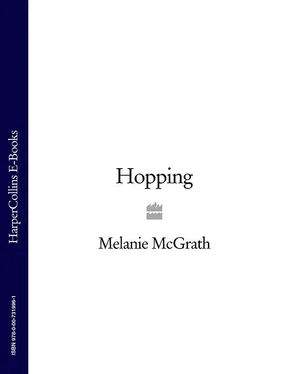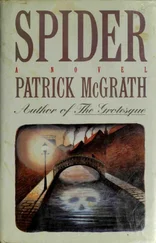1 ...7 8 9 11 12 13 ...19 Daisy picked up a bine of her own. The soft stem, still coiled clockwise, felt downy and wet. She moved her hand along it, reached a short stem from which a few cones hung, and pinched. The cones did not give way immediately and she was surprised at how hard she had to squeeze her fingers to maintain a purchase on the short stem. So this was where Billy had perfected his pinching technique. No wonder he was such a master at it. She carried on down the bine, stripping and pinching, until she reached the end, then, copying Billy, she lay the naked bine neatly down in the alley and reached for another. Franny sat beside her, playing at picking, but for every cone she removed from its stem, she picked a half-dozen leaves. The work wasn’t arduous exactly, but neither was it as simple as it had at first seemed. From time to time Billy took up the umbrella and emptied it into the basket at the top of the alley. Every so often a pole puller came round with a wooden pole on to which was bound a curved knife. With this hop dog, he sliced at the bines caught in the roof of the factory, and having cut them, he yanked each in turn until they tumbled to the ground. Over in one corner of the garden, a family had begun singing.
They are lovely hops
When the measurer comes round
Pick ’em up, pick ’em up off the ground
When he starts to measure, he don’t know when to stop
But we don’t care, we’ll pick some more
Cause they are lovely hops
Oh! Lovely hops they are
They are lovely hops .
Soon they were joined by others, until the song spread right out across the garden.
After an hour or so there was a great cry of Tally! from the top of the drift and Alfie shouted Hover up! , at which Billy Shaunessy dropped what he was doing and raced to the basket. By the time Daisy reached it, he was already elbow deep in the hop basket, pulling up twigs and leaves and turning over the hop cones so they sat lightly on one another and filled more of the basket.
Two men appeared at the top of the Shaunessys’ drift. One of them scooped out the cones into a smaller basket, then tipped them into a long, cylindrical sack, while the other handed Alfie a wooden tag and made notes in a book. A family followed behind, collecting up the cylindrical sacks, sealing them and heaving them up on to the same wagon that had brought their bags from the station.
Over the course of the next few hours, Daisy began to refine her technique, speeding up the pinching action until she was picking almost as fast as Billy. Before long, she realised that the bines were coated with tiny claws pointed in a downward direction. If you pushed your hands upwards, the claws pricked and the skin soon became very irritated and sore, but so long as you kept your hands moving towards where the root of the plant would have been, the claws didn’t bother you. Once she realised this, she noticed that Billy Shaunessy was meticulous about avoiding being pricked but had not bothered to warn her. Well, never mind. After a day or two’s practice, she would have perfected the art of pinching. Then he’d better watch. There was not much between hopping, she thought, and assembling flowers. Though the flowers were fiddlier, both required the same complex hand movements but demanded no particular mental effort, and pretty soon she found she was free to allow her mind to wander. She thought about her mother then, and how much she was already missing her father. At midday another bell rang and everyone immediately stopped picking and set about preparing lunch. While Mrs Shaunessy handed round slices of Dutch cheese and raw onions, wrapped in sacking to protect the food from the bitter tar now covering everyone’s hands, Joan put a kettle on the paraffin stove and made everyone a cup of tea sweetened with condensed milk. Heated discussions broke out about the heaviness or lightness or houseyness of the cones, whether they were larger or smaller than usual, and whether they were softer or crisper, ripe or unripe. Half an hour later the bell rang to signal the end of lunch, and bit by bit the women and children vanished back down the green factory walls.
By mid-afternoon, the sun was beating down hard through the canopy of leaves and the gardens were sultry and filled with dappled light. A nearby family began a rendition of ‘Only a Bird in a Gilded Cage’ and others joined in, some in rueful tones, but everyone seemed in good humour. At five o’clock, when Daisy’s arms and shoulders were aching and her hands were dark as fury and the fingers needly and stinging, the man on the chestnut horse rode by and called out No more bines and, a few moments later, Daisy found herself in the flow of women and children heading out of the green factory and back along the flinty lane towards Pheasant Field.
Lilly was waiting for her outside hop hut number 21.
So?
Daisy looked at her blackened hands.
Oh, that ain’t nothing to fuss over , Lilly said. Here, you wanna come blackberrying? Daisy glanced over at Franny but she seemed to be busy with some game, so she left her there.
The two girls started down Pheasant Field hand in tarry hand, washing themselves in the trough just beside the gate, then they continued on until they reached Featherbed Lane. Turning north, they marched along the flints, grabbing at delicate umbrels of cow parsley and scatters of pink bladder campion as they went, as far as Danecourt Bridge where the railway line formed steep shoulders lined with hazel and elderflower and brambles, stopping every so often to plant blackberries in their mouths, and by the time they returned to the huts, Pheasant Field was already bathed in twilight shadow. There were fires lit and some families had made torches from bulrushes, which gave off a magical, orange light. Someone was playing a piano accordion, and outside number 21 Alfie was cursing the wall-eye that left him unfit for duty and Mrs Shaunessy was talking about the letters she’d already had from Patrick. It wasn’t all rosy. Some of the letters the sweethearts sent to the soldiers made them laugh. In one, Patrick had said, a young wife had asked her husband how many times the soldiers had managed to get out to the pictures. Patrick Shaunessy was trying not to be too downhearted, though, because the war would be over soon. He was sorry not to be able to visit the hop that year, and he missed it, since to him the hop was the merry in England and the great in Britain all combined. Still, he said, Marie was to keep his place for him, because as sure as eggs is eggs, he’d be there next year.
Alfie said he’d drink to that and the adults all raised their mugs of tea and Mrs Shaunessy started up ‘It’s a Long Way to Tipperary’.
The following morning Daisy woke to a dewy dawn full of cobwebs and pink-tailed rabbits. At seven thirty she and Franny set off once more with the others through the oak gate towards the great green factory. Daisy picked quickly from the start now, methodically stripping and pinching until she had a rhythm going. After a lunch of bread and cold sausages, Mrs Shaunessy told Franny to go and play, and without the distraction of her sister, Daisy found she could work faster still, her fingers and hands knitting the delicate movements together with such proficiency that by the time the man on the chestnut horse had called No more bines , she was confident she had perfected her technique, and she sensed from the care Billy Shaunessy was taking with her that he knew it too. If nothing else, hopping had given her a pinch to be reckoned with.
That evening, Mrs Shaunessy told them to go off and play, so Lilly took Daisy to the old gravel pit where a colony of feral cats was chasing butterflies, and they gave each cat a name – Big Marmalade, Smuts and Ship’s Cat. Daisy noticed not only how many butterflies lived in the country, but also how many birds there were, so many that even if you rolled your index finger and thumb into a tiny circle and looked through the hole, there would always be birds trapped inside your fingers. They were returning back across the fields when they saw Billy coming towards them with a smirk on his face, saying Mrs Shaunessy wanted Daisy to return immediately to Pheasant Field. There they found a great hullabaloo of women, with Franny, red faced and weepy, at its centre.
Читать дальше












